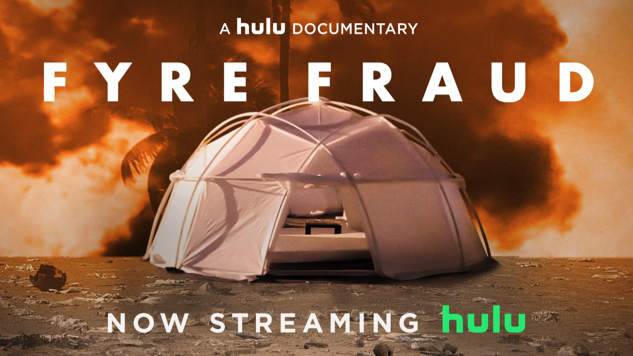Fyre Fraud Loses Sight of the Scandalous Festival In Pursuit of Millennial Bashing
Written by Ian Thomas Malone, Posted in Blog, Movie Reviews, Pop Culture
Millennials are a frequent punching bag for the media. Apparently, we’re selfish, superficial, and we ruin everything, claims that we’re supposed to believe have never applied to any other generation. Hulu’s new Fyre Fraud documentary, one of two films released about the disastrous festival in the Bahamas, builds its premise based on the notion that such a grift could only work in modern times. Such a thesis seems to forget that America’s luxury class has always pursued community through exclusivity.
Social clubs have been popular for hundreds of years, granting access to those deemed worthy of membership in the eyes of the elite. Hugh Hefner’s Playboy Club was built around the same premise, mainstreaming a sense of community through a shared interest in seemingly refined tastes. People frequent cigar lounges not for smokes, but for the chance of a fraternal bond blossoming beneath the fumes.
Fyre Fraud paints Fyre Media CEO Billy McFarland, currently serving a six-year prison sentence for crimes related to the festival, as a kind of genius capable of manipulating the easily-fooled millennial masses. The younger generation somehow deserves some blame for falling victim to the con, which hired hundreds of influencers to create an aura of luxury before any infrastructure was put in place to deliver on such promises. The documentary hoists McFarland up as a natural symptom of a narcissistic generation, hailing him as the spiritual successor to The Wolf of Wall Street Jordan Belfort.
The documentary is less about the festival than it is about McFarland, who was paid to appear in the film under ethically dubious circumstances. Billed as a “true-crime comedy,” Fyre Fraud uses frequent animated cutaways to poke fun at the disaster. There’s a lot to laugh at about Fyre Festival, as social media at the time collectively mocked the hoards of rich kids stranded in the Bahamas after being denied the luxuries they overpaid for. For some reason, the documentary felt obliged to play the role of standup comedian rather than to let the contemporaneous jokes speak for themselves, laughing off serious material that deserved closer scrutiny.
There are a few scenes where the interviewers hold McFarland’s feet to the flames, but can’t manage to shake anything substantive from his slick hands. There are natural reservations on his part to not reveal any information that could add to his prison sentence, but he isn’t forthcoming about much of anything at all. It’s hardly uncommon for a subject to not appear in a hostile documentary, which begs the question of why the film felt the need to pay him to appear at all. Such time could have been spent providing a fuller picture of how the festival was doomed from the get-go, or to showcase the many Bahamians who were conned out of payment for their services.
The documentary does shed some much-needed light on the involvement of Jerry Media, the company behind the infamous “fuckjerry” Instagram account that helped market the festival. Jerry Media produced the other documentary on Fyre Festival, a conflict of interest that deserves to be called out, but Fyre Fraud handles this footnote in a way that seems driven less out of journalistic obligation than as a dunk to claim moral superiority over a competing narrative. There are certainly other people to blame for Fyre Festival than simply McFarland, but this documentary doesn’t spend much time on any of the other perpetrators beyond those who dared to make their own film about the experience.
Fyre Fraud hoists Billy McFarland up as a straw man indictment against millennials, casting aside a thorough examination of the festival in favor of cheap laughs. Grifters like McFarland have been around for thousands of years, robbing Peter to pay Paul. The only difference between McFarland and Charles Ponzi is that none of Ponzi’s victims were able to post an Instagram picture of their experience. The documentary allows McFarland’s charms to suck the air out of the room, lazily criticizing millennials at the expense of exploring the greatest con in festival history.











